22 Healthy Ways To Sweeten Coffee Without Sugar
This post may contain affiliate links. As an Amazon Associate I earn from qualifying purchases.
Looking for healthy ways to sweeten your coffee without sugar? You have come to the right place! I have created a list of the best ways to sweeten your coffee without sugar. From Stevia, to coconut oil, to protein powder, you’ll find 22 healthy ways to sweeten coffee right here!

Let’s chat about our favorite brew. We all know how a warm cup of coffee can set the right tone for the day or give us that mid-day pick-me-up we sometimes desperately need. But here’s the thing – adding spoonfuls of sugar to our joe isn’t really doing us any favors, health-wise. If we’re not careful, our sweet tooth might be leading us down a not-so-sweet path.
Related: Is chai latte healthy?
But don’t worry, I’ve got your back. I’m not going to suggest you brave the bitterness of black coffee (unless you’re into that, of course). Instead, I am going to share some seriously good, health-friendly alternatives to sweeten your coffee without table sugar. Stick with me, and I promise you won’t even miss the white stuff.
Understanding the Sugar-Coffee Dilemma
Now, don’t get me wrong – I am not here to demonize sugar entirely. In moderation, it’s okay. The problem starts when that ‘teaspoon or two’ begins to multiply, turning our innocent cup of joe into a sugary rollercoaster ride for our bodies.
Frequent sugar rushes can lead to a host of health issues, like weight gain, tooth decay, and even increase the risk of type 2 diabetes. Not exactly what we signed up for when we reached for that comforting coffee mug, right?
So, what’s a coffee lover to do? It’s simple – we find a better way. A way to keep our coffee deliciously sweet without the health pitfalls of excess sugar. And that’s where our natural sweeteners for coffee enter the scene, ready to swoop in and save the day.
They’re here to prove we can enjoy our daily brew and take care of our health at the same time. Because let’s face it – our coffee moments should be about pure enjoyment, not compromise.
Healthy ways to sweeten coffee cheat sheet
- Stevia
- Erythritol
- Monk Fruit Extract
- Xylitol
- Yacon Syrup
- Raw Honey
- Agave Syrup
- Coconut Sugar
- Pure Maple Syrup
- Blackstrap Molasses
- Dates and Date Syrup
- Protein Powder
- Banana Puree
- Vanilla Extract
- Cinnamon
- Unsweetened Cocoa Powder
- Nut Based Milk
- Coconut Cream
- Grass-fed Butter
- Coconut Oil
- Healthy Store-bought Creamers
- Healthy Homemade Creamer
22 Healthy Ways To Sweeten Coffee Without Sugar
1. Stevia
Stevia is one of the more popular sweeteners out there. And for good reason! It has zero aftertaste, zero calories, and is easy to find at most grocery stores. This makes it a fabulous choice for anyone looking to cut down their sugar intake, manage their weight, or simply live a healthier lifestyle.
Stevia also packs a powerful punch, being up to 200 times sweeter than sugar. You only need a pinch to match the sweetness of a heaping spoonful of sugar.
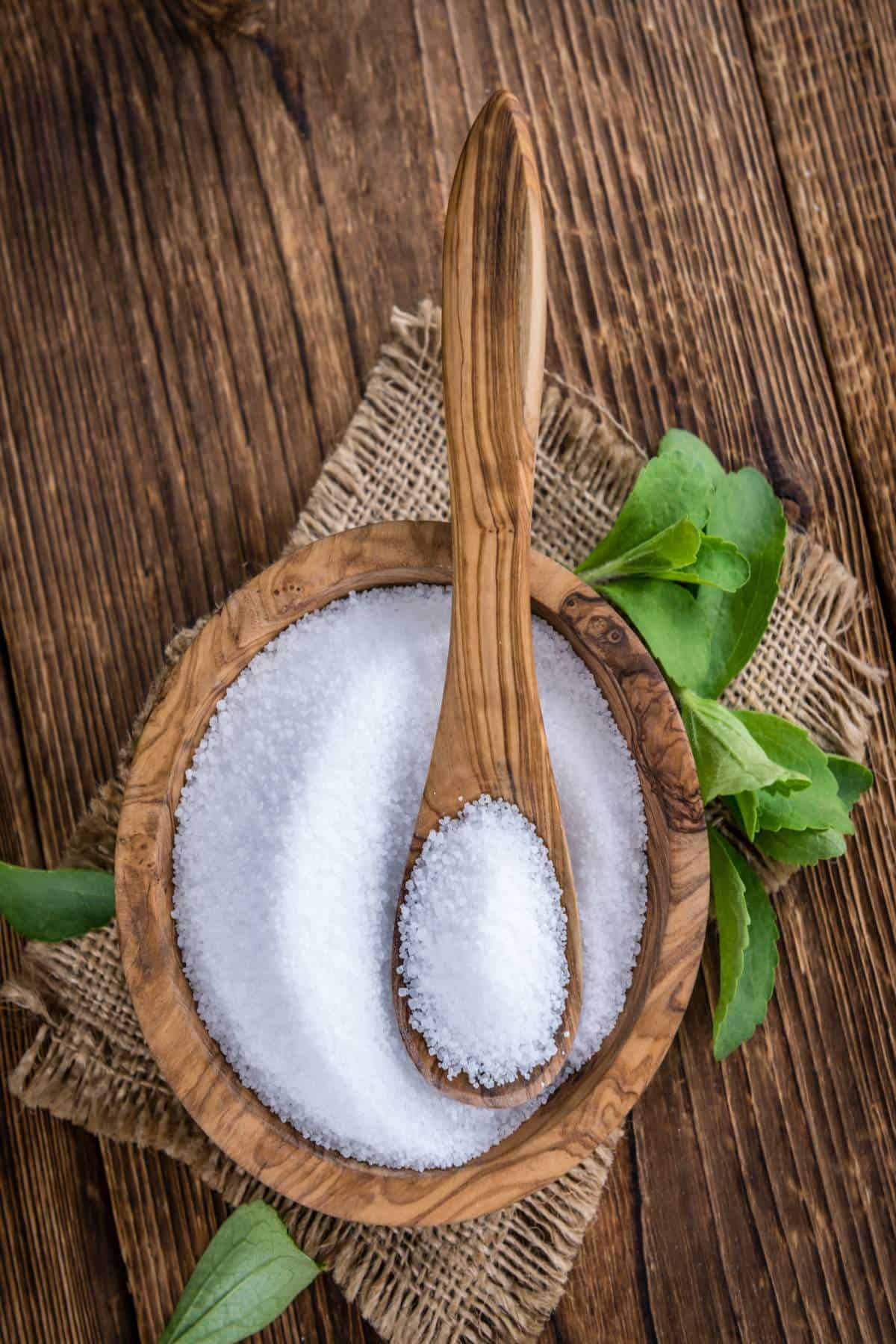
2. Erythritol
Erythritol is another great way to sweeten your coffee without sugar. It matches the sweetness of sugar and dissolves well in hot drinks.
While erythritol is generally well-tolerated, some individuals might experience digestive discomfort. Therefore, it’s advisable to try it in small amounts initially to determine its suitability for your system.
3. Monk Fruit Extract
Monk fruit extract, a natural, zero-calorie sweetener derived from a small fruit native to Southeast Asia, is impressively potent. It’s 150-250 times sweeter than regular sugar, so just a tiny amount can sweeten your cup of coffee.
Notably, it doesn’t impact blood sugar levels, which makes it a suitable choice for those managing conditions like diabetes or adhering to low-carb or ketogenic diets.
On the flip side, due to its high sweetness, getting the right amount for your coffee can take some trial and error. Too much might overpower your brew, while too little might not meet your sweetness preference.
I would recommend to start small and adjust to taste. And while monk fruit extract is generally well-tolerated, everyone’s body responds differently. So, if you’re giving it a first try, be mindful of how your body reacts.
There are several brands, including Monk Fruit In The Raw, Lakanto, and Whole Earth that offer monk fruit sweeteners.
4. Xylitol
Xylitol is another sugar alcohol, derived from plants. It tastes similar to sugar but has 40% fewer calories.
Note: Xylitol is toxic to dogs, so be cautious if you have a pet.
5. Yacon Syrup
Yacon syrup, a sweetener extracted from the South American yacon plant, brings a unique element to the table of natural sweeteners. What sets it apart is its high content of fructooligosaccharides, or FOS. These are a type of prebiotic fiber that promote good gut health by stimulating the growth and activity of beneficial bacteria in the colon.
Not only does yacon syrup provide a subtly sweet flavor to your coffee, it also serves up some meaningful health benefits. Its FOS content is known to help regulate digestion, improve immune function, and enhance mineral absorption in the body.
Plus, because most of the FOS can’t be digested, yacon syrup is low in calories, making it a thoughtful choice for those watching their caloric intake.
When using yacon syrup, keep in mind that it has a distinct taste, somewhat similar to caramel or molasses. Start with a small amount in your coffee and adjust according to your preference. As always, individual responses can vary, so it’s recommended to monitor how your body reacts to this sweetener.
6. Raw Honey
Raw honey is a minimally processed form of honey that retains more of its natural enzymes and antioxidants. It is a great way to cut out refined sugar in coffee.
It is a natural product, sweeter than sugar, and has a lower glycemic index, so you can use less of it and still enjoy a sweet flavor. Winning! Additionally, honey brings added benefits to your cup of joe.
Just remember to consume honey in moderation, especially if you’re mindful of your sugar intake or have specific dietary considerations.
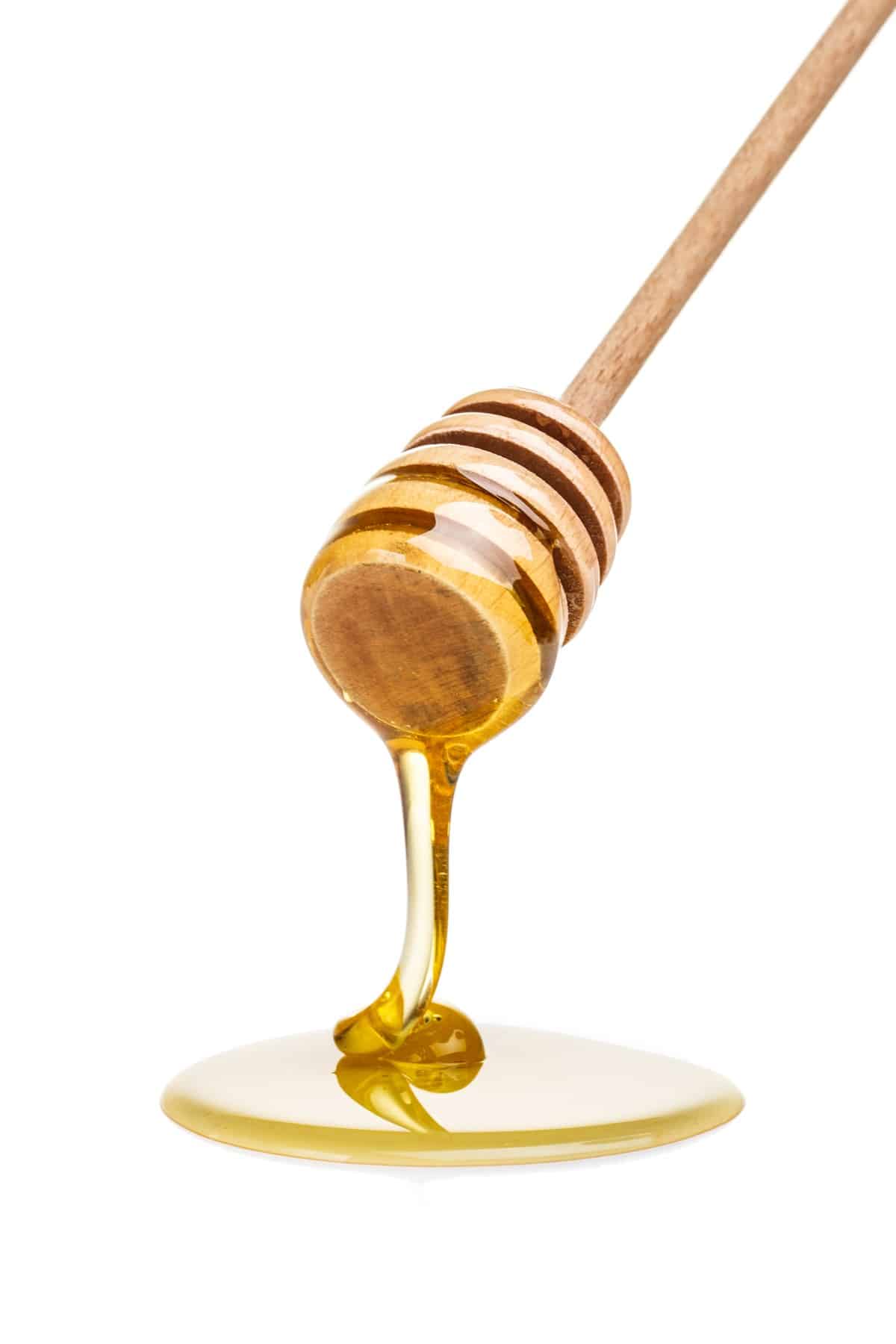
7. Agave Syrup
Agave syrup, derived from the agave plant, is another fantastic option for sweetening your coffee naturally. With its high sweetness intensity, agave syrup allows you to use smaller quantities to achieve the desired level of sweetness.
Like honey, it also has a low glycemic index, ensuring a more gradual impact on your blood sugar levels compared to regular sugar.
8. Coconut Sugar
Coconut sugar, extracted from the sap of coconut palm trees, is a great way to sweeten your coffee naturally. It is still a sugar but not a refined sugar. It brings a unique flavor profile to the table, with hints of caramel that add a touch of richness to your brew.
What’s great about coconut sugar is that it’s sweeter than regular sugar, so you can use less of it to get that desired level of sweetness in your coffee.
Bonus: it has a lower glycemic index than plain sugar. That means it won’t give you the same blood sugar rollercoaster ride, keeping you on a more steady energy track.
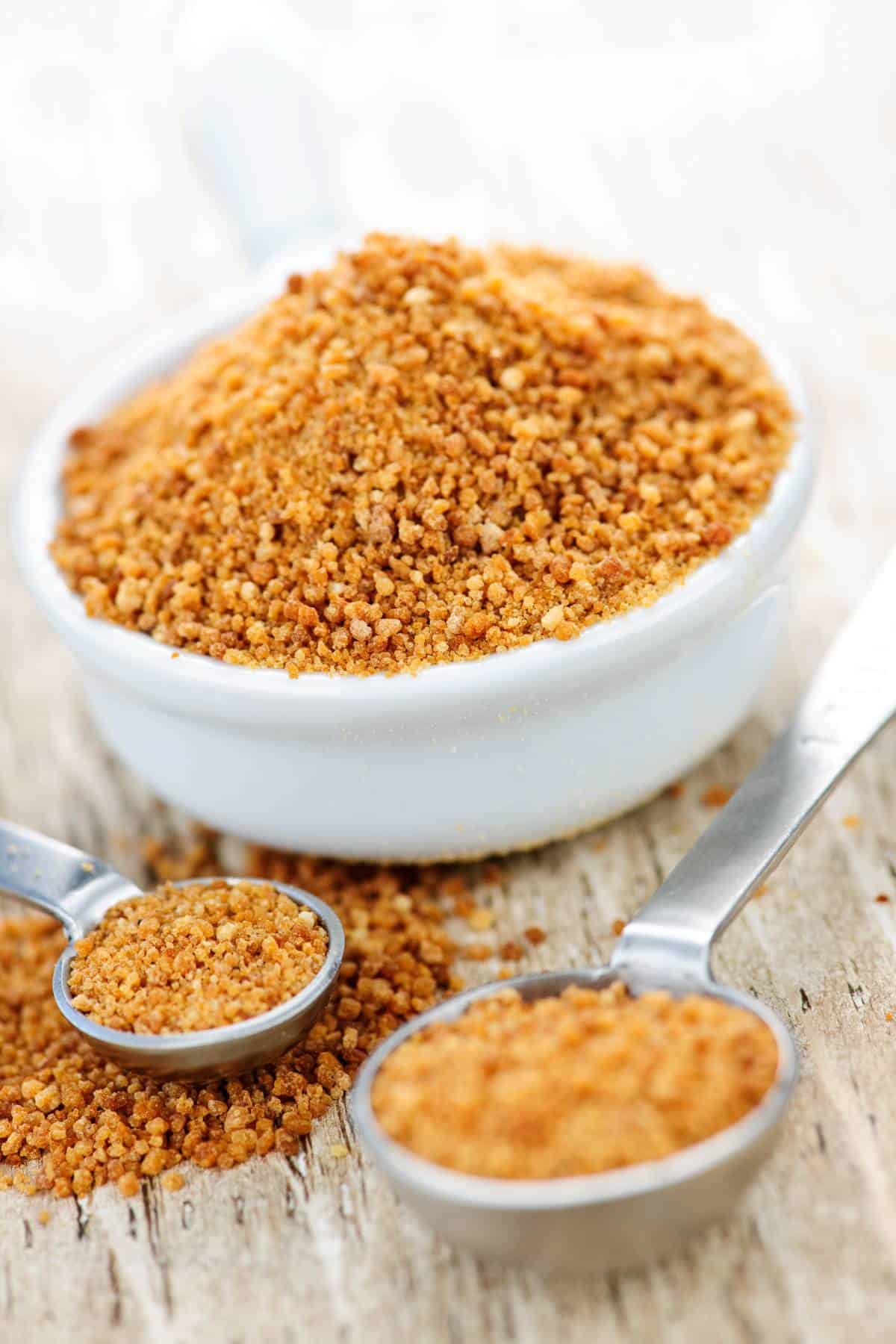
9. Pure Maple Syrup
Maple syrup in coffee? Believe it or not, this natural sweetener works wonders and adds a unique flavor dimension to your daily cup of joe. The rich and distinct taste of maple syrup blends harmoniously with the flavors of coffee, creating a delightful and indulgent experience. Trust me – you have to try it!
Beyond its flavor, maple syrup brings some additional perks to the table. It contains essential minerals like manganese and zinc, along with antioxidants that can contribute to your overall well-being.
Just remember to enjoy it in moderation as maple syrup is still a concentrated source of sugar.
10. Blackstrap Molasses
Blackstrap molasses is rich in minerals, including potassium, magnesium, selenium, and iron, which can enhance energy levels and support brain and muscle function. When combined with the caffeine stimulation from your coffee, it can provide an extra boost to kickstart your day.
However, it’s important to consume blackstrap molasses in moderation as it is still a source of sugar. One tablespoon contains about 60 calories, mostly from carbohydrates, which should be considered based on your dietary goals.
While it may not be the most diet-friendly option, if you enjoy the taste, it’s a flavorful alternative that offers more nutritional value than regular table sugar and is lower on the glycemic index.
11. Dates and Date Syrup
Dates and date syrup offer a natural and wholesome way to sweeten your coffee. Dates, which are the fruit of the date palm tree, have a naturally sweet taste and a rich flavor. They can be blended into a puree or transformed into date syrup, which is a thick and sweet liquid made from cooked and strained dates.
When added to coffee, dates or date syrup provide a gentle and balanced sweetness. Additionally, dates contain essential nutrients like fiber, potassium, and magnesium, offering some nutritional value to your morning cup of coffee.
12. Protein Powder
Protein powder can be a great addition to your coffee, especially if you’re looking to boost your protein intake or add more substance to your beverage. By adding a scoop of protein powder to your coffee, you can transform it into a satisfying and nutrient-rich drink.
Depending on the type of protein powder you choose, such as whey, plant-based (e.g., pea, soy, or hemp), or collagen, it can contribute to your daily protein requirements while offering various additional benefits.
Rachel’s Nutrition Tip: Protein is essential for muscle repair and growth, and it can also help you feel fuller for longer, potentially aiding in weight management.
When mixed with coffee, protein powder can provide a creamy and frothy texture, similar to a latte or a blended drink. It can add a touch of flavor, depending on the type of protein powder you select, but it’s important to note that some varieties may be more neutral in taste.
To incorporate protein powder into your coffee, simply blend it with a small amount of hot coffee or prepare it separately and mix it in afterward. Remember to choose a high-quality protein powder and follow the recommended serving size to ensure you’re meeting your nutritional needs.
13. Banana Puree
Ok…hear me out on this one. Banana and coffee definitely sounds like an odd combination but the natural sweetness of ripe or overripe bananas complements the deeper, rich notes of coffee beans remarkably well.
Try this banana milk coffee recipe which combines banana, coffee, milk, and a small amount of honey. I would love to hear what you think of it.
Banana Milk Coffee Recipe

14. Vanilla Extract
Although vanilla is not classified as a sweetener, pure vanilla extract does have a mildly sweet flavor which goes great in coffee. Adding a few drops of pure vanilla extract can eliminate the need for any additional sweeteners entirely.
You can also experiment with other extracts such as peppermint, almond, hazelnut, etc. The sky is the limit!
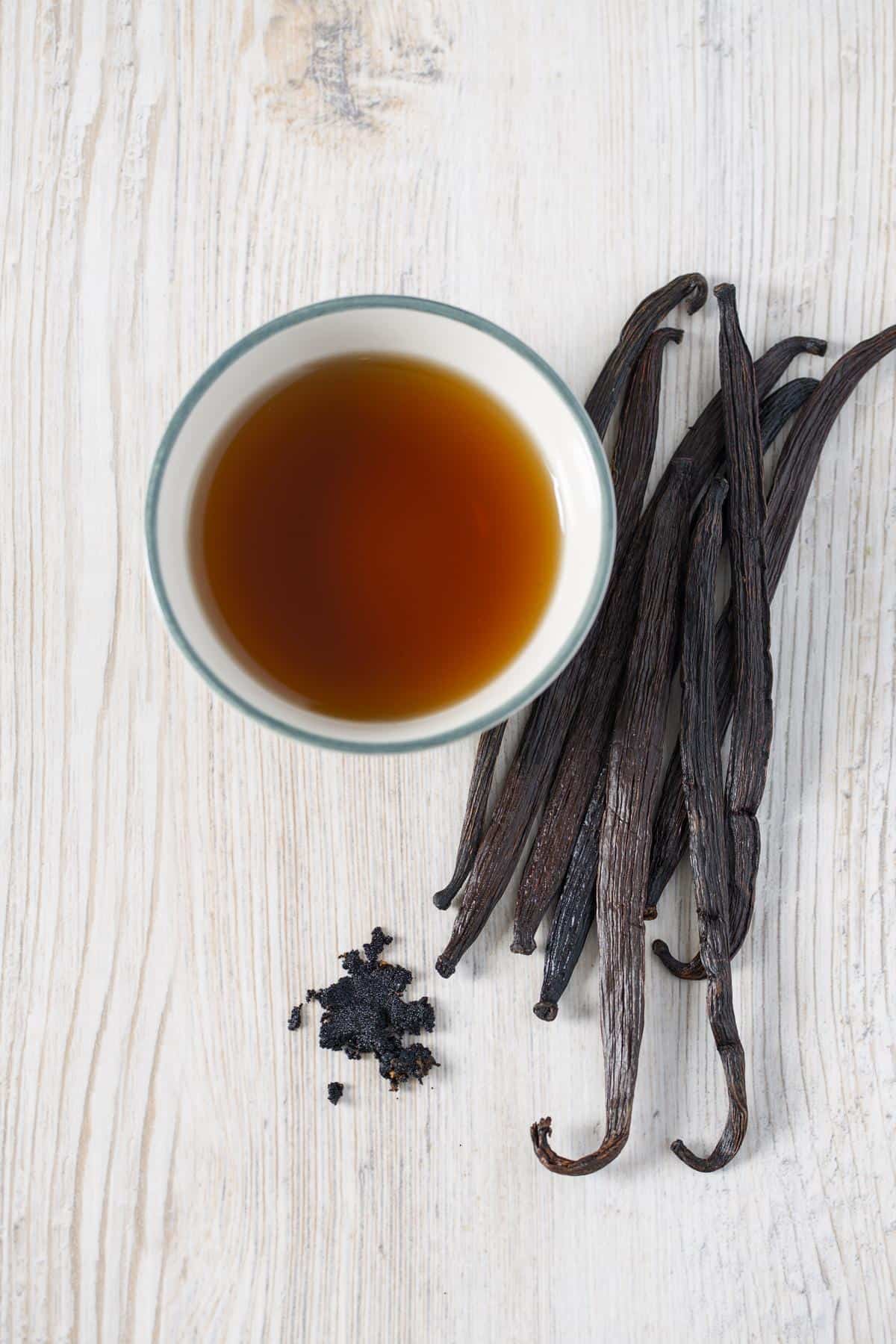
15. Cinnamon
Similar to the vanilla extract, cinnamon is not a sweetener but it adds an ah-mazing flavor to your coffee and can trick your palate into thinking your drink is sweeter than it actually is.
I recommend this Ceylon Cinnamon.
Pro Tip: Get extra fancy and add your cinnamon to your coffee grinds before you brew them.
16. Unsweetened Cocoa Powder
Unsweetened cocoa powder can bring a touch of indulgence to your coffee. With its rich and deep flavor, cocoa powder adds a delightful chocolatey note to your cup that may just eliminate the need for any added sugar. Give it a try!
17. Nut Based Milk
When it comes to subtly sweetening your coffee, plant-based milks like almond milk or coconut milk offer a fantastic option without the need for added sugar substitutes. The nutty flavor profile of almond milk adds a delightful twist to your coffee, providing a creamy and satisfying experience.
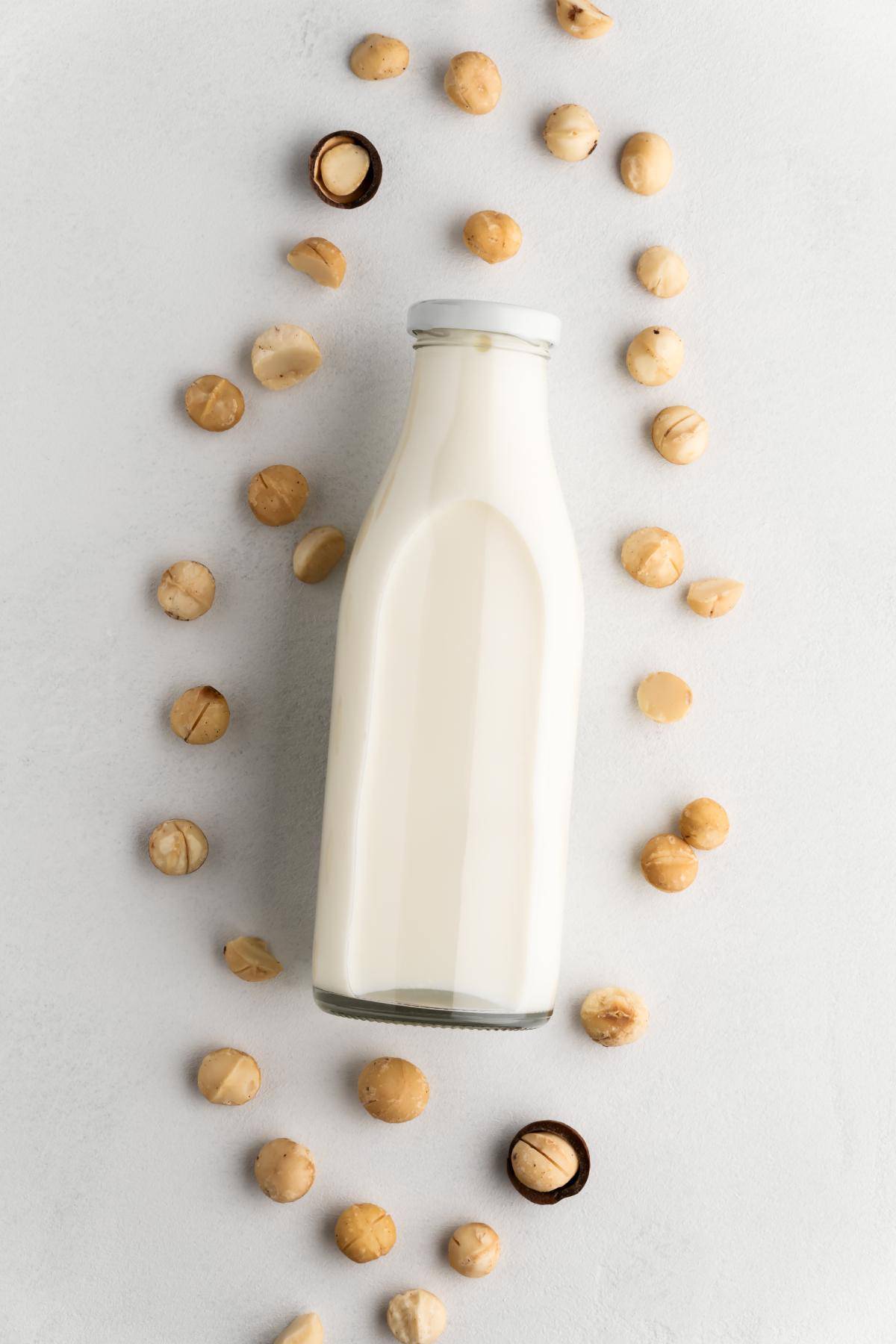
18. Coconut Cream
Coconut cream, the creamy and dairy-free alternative, not only adds a hint of natural sweetness to your coffee but also provides a velvety smoothness without the need for additional creamer or sweeteners.
It offers a delightful touch of tropical flavor while making your coffee wonderfully creamy. Plus, being dairy-free, it’s a fantastic option for those with dietary restrictions or preferences.
19. Grass-fed Butter
Grass-fed butter is a healthy fat that can infuse your coffee with a rich and delicious flavor.
Ever heard of bulletproof coffee? It combines grass-fed, unsalted butter, coffee, and MCT oil in a blender. This concoction creates a creamy and satisfying drink that can keep you fuller for longer, reduce coffee jitters, and provide sustained energy throughout the day.
Bonus: Grass-fed butter contains higher amounts of antioxidants, including omega-3s, which offer additional health benefits.
20. Coconut Oil
The healthy fats in coconut oil can provide a feeling of fullness and sustained energy. Just add a teaspoon or tablespoon of melted coconut oil to your coffee and enjoy the creamy goodness.
Remember: Coconut Oil is very calorie dense so use in moderation and as part of a balanced diet.
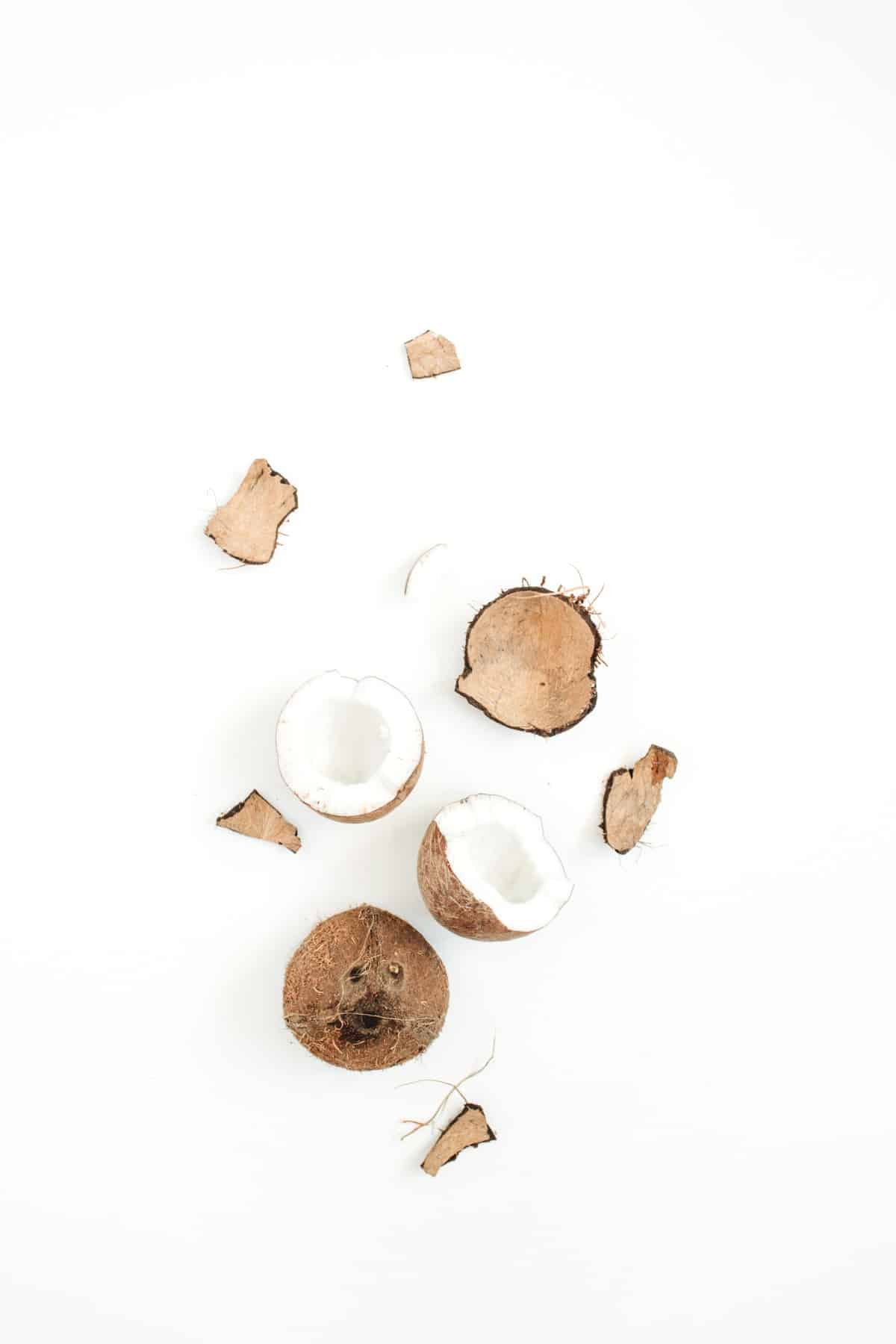
21. Healthy Store-bought Creamers
There are some great creamers on the market now, like Nutpods and Califia Farms, which offer convenient options to add creaminess and flavor to your coffee without the need for traditional dairy creamers. These plant-based alternatives are often made from ingredients like almonds, coconuts, or other nuts, providing a rich and creamy texture.
Brands like Nutpods and Califia Farms focus on creating creamers with clean and natural ingredients, free from artificial additives and preservatives. They offer various flavors to suit different preferences, such as vanilla, hazelnut, or original unsweetened.
Pro Tip: When choosing a store-bought creamer, it’s always best to check the ingredient list to ensure it aligns with your dietary preferences and needs. Many creamers contain added sugars or other additives.
22. Healthy Homemade Creamer
Making your own homemade creamers is a wonderful way to enjoy healthier options tailored to your taste.
- For an almond milk creamer, blend unsweetened almond milk with vanilla extract and a natural sweetener like maple syrup.
- A coconut milk creamer can be made by combining full-fat coconut milk with honey or agave syrup, adding cinnamon or cocoa powder for extra flavor.
- Cashew creamer involves soaking cashews overnight, blending them with water, and sweetening with honey or dates.
- Oat milk creamer is made by blending rolled oats with water, sweetening with maple syrup, and adding a dash of salt and vanilla extract.
Homemade Healthy Coffee Creamer (Paleo & Vegan)
Check out this recipe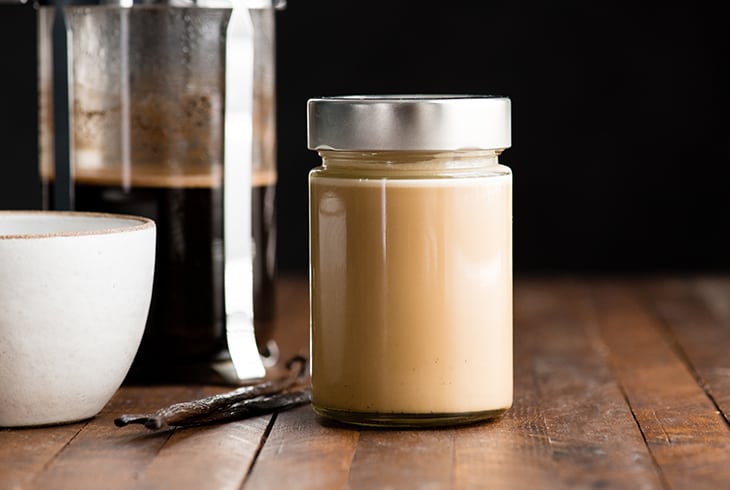
Making the Swap: Tips for Transitioning to Natural Sweeteners
So, what about how to transition from sugar to natural sweeteners? I won’t sugarcoat it (pun intended) – changes in our routine can be a tad tricky at first. But here’s the cool part – our taste buds are quite adaptable, and with a few simple tricks up our sleeve, we can make this swap smoother than a well-brewed latte.
First things first, patience is key. You don’t have to go from sweet to unsweetened overnight. Start by gradually reducing the amount of sugar you add to your coffee, and introduce natural sweeteners into the mix. This will give your taste buds some time to adjust.
Next up, experiment a little! There are so many natural sweeteners out there – honey, maple syrup, stevia, coconut sugar, just to name a few.
Each of these adds its own unique flavor to your coffee, so play around and find your new sweet spot. Remember, it’s not about replacing like for like, it’s about discovering a new way to enjoy your beloved brew.
And lastly, keep it positive! Remember why you’re doing this – to embrace a healthier lifestyle and take care of your well-being. Every step, no matter how small, is a victory. So, here’s to making our coffee moments not just a little sweeter, but healthier too. Are you ready to give it a shot? I know you can brew it. 😉
Frequently Asked Questions
Yes, these natural sweeteners and creamers can generally be used in any type of coffee. Whether you prefer black coffee, espresso, drip coffee, or cold brew, you can add these sweeteners or creamers to enhance the flavor and customize your drink according to your taste preferences.
Absolutely! These natural sweeteners and creamers can be versatile additions to a variety of beverages beyond coffee. You can incorporate them into teas, whether it’s black tea, herbal tea, or chai, to add sweetness and flavor. They can also be used to enhance the taste and creaminess of smoothies, providing a nutritious and delicious twist
When using natural sweeteners, it’s important to be mindful of potential GI upset, especially if you have sensitivities or intolerances to certain ingredients. Additionally, moderation is key, as these products can still contribute to your overall calorie and sugar intake. If you experience any adverse effects, it’s best to discontinue use and consult a healthcare professional if necessary.
For weight loss, the best sugar substitute in coffee would likely be stevia. It’s a zero-calorie sweetener derived from a plant, and it’s much sweeter than sugar, meaning you can use less. This can help reduce overall caloric intake, which is beneficial for weight loss
